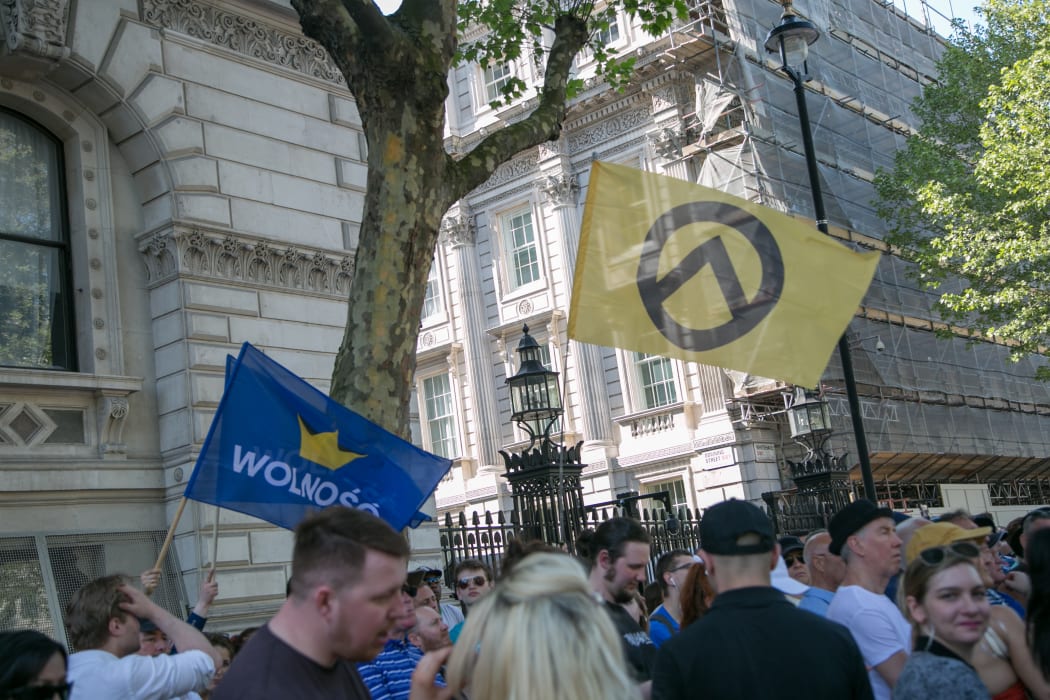Julia Ebner's work involves monitoring extremist groups, but she wanted to go one step further to understand them, so went undercover into a string of international jihadist and alt-right groups.
Ebner says creating identities to go undercover and infiltrate extremist groups was like creating fictional characters for a novel. But it didn't always go to plan. In fact, once she dropped her personal credit card at a white nationalist meeting.
Ebner works for the London-based Institute for Strategic Dialogue, which monitors the behaviour of extremist groups
She talked with Jim Mora on Sunday Morning, to discuss her new book Going Dark: The Secret Social Lives of Extremists.

A neo-Nazi and right-wing protest in Hanover, Germany, in 2019. Photo: AFP
Jim Mora - You speak five languages and decided to infiltrate various groups. How do you stay in character - how do you avoid being rumbled?
Julia Ebner - In most of the cases I was just sticking with the characters I built up with my online avatar account. I already had people in my head when maintaining these accounts for several weeks.
It was almost like making up a character for a novel, I had to know exactly what the past of that person was, what the present, and also the future kind of desires and motivations for joining the group.
JM - There would have been many anxious moments, because you do not want to be discovered?
JE - Absolutely, and I also made a lot of really stupid mistakes to be honest, because I was never professionally trained for going undercover. It's not like I'm a secret agent with MI5. So some of it was also quite improvised, and there were moments when I was almost uncovered in the situation.
For example once, I dropped my credit card that had my name on it, at the secret strategy meeting of a white nationalist meet-up in an Air Bnb in Brixton. And once I also signed an email with my real name of Julia instead of Jennifer.
JM - The tradwives, anti-feminists who believe in relationship market- value for women, pleasing their men, submitting they say to the natural calls of human evolution - what sort of women are they?
JE - It was one of the communities that I found the most terrifying. You could see that there were women from all kinds of different backgrounds, ranging from ultra-conservative women who wanted to go back to the gender roles of the 1950s, all the way through to women who were explicitly endorsing domestic violence, or what they called domestic discipline, and were also feeding into the wider misogynist online ecosystem of the manosphere.

Julia Ebner, author of Going Dark. Photo: Supplied
JM - The problem with these women, who take the 'red pill' as it's referred to from The Matrix movie, the problem isn't them, if they want to stay at home and cook and clean - that's a choice, it's the submission demanded by the red pill men, and the abuse and contempt?
JE - Yes. There are also some female influences within those tradwife communities, or red pill women communities, as they call themselves - who give instructions to men how to red pill their wives or their girlfriends.
JM - The strange rationale is that respecting your husband will end any abuse?
JE - Exactly, basically that women should not speak up against any kind of verbal abuse, or even physical abuse, that they should just keep silent basically.
It's also the way that they frame themselves, as almost the new counter-culture to the mainstream feminist or ultra-liberal establishment. It's quite an interesting dynamic, where you see also increasingly really young generations joining some of these communities.
JM - But you liked the sorority of the tradwives? So there was a kind of appeal - in what way?
JE - I could feel that the topics that they were talking about, and the fears that they were addressing, really were resonating with me. And they also mattered to me.
For example, they were talking about double-burdens in women's lives in the modern world. Also, the fast paced dating life, online dating apps, the so-called hook-up culture. These are all topics that I felt as a woman I could relate to, and the community was almost framing itself as a kind of self-help forum, or as a counselling forum.
It felt nice to connect with women who had similar concerns, and I was myself in quite a vulnerable state I think, at the time when I did these investigations. So, it really also showed me that anyone, and from any background could potentially be lured into these networks if it happens at a weak moment in time.
JM - You say red-pilled women are chasing this fantasy of being the perfect wife, and on the other hand many enlightened women are chasing this fantasy of needing to be super-competent, super-successful and hot as well?
JE - Yeah, absolutely.

Tradwives and red pill women are far-right women's movements. Photo: 123rf
JM - So, maybe if you got lucky as a tradwife with the right bloke it might be more relaxing, but that probably isn't the norm?
JE - I'm sure it isn't the norm. And there were also lots of women who then reported about physical abuse, and that they were just accepting that, and wanted to submit to their husbands.
And it was really shocking to see how some women ended up actually really being indoctrinated quite quickly after joining that community.
JM - Then in your book you come to the jihadi brides, and speaking of closeness - the emotional appeal of belonging to the group. The jihadists of Indonesia have operated as families... how did you come to go among them?
JE - It was similar to the tradwives community. I spent around two years in that group. You could see how some of the women that joined felt like they were almost replacing their families.
They were getting support, they were getting advice on very personal matters, they were sharing a lot of their fears. And you could see how there was a form of sister-hood.
JM - You took a risk going among them didn't you - how were you received?
JE - In general there weren't many questions, up to the point when the attacks in Indonesia happened, and a lot of the women became really suspicious and fearful that the security agencies might have infiltrated their networks, and they might be uncovered.
But also, I think because I had joined in the very beginning, when there were only a few women in that group. So they didn't really think of the possibility of the security services being in their group at such an early stage.
JM - Who did they think you were?
JE - A German-based jihadi bride whose husband or family had travelled to Syria.
JM - One of the jihadi women you talked to thinks at one point in her indoctrination that she may be going too far in her newfound zeal. How does she rationalise that away?
JE- That was quite interesting, because she talked of - the leader then talked of a personal estrangement strategy, where she said it's important to be aware that actually everyone in your family, or your friends would try to dissuade you from being part of this group, and try to manipulate you. And they're actually betraying real Islam.
And this is what real Islam is like, and you should get used to the feeling of estrangement from all others who don't believe in it.

Indonesian jihadi brides arrive at a camp, after fleeing the Islamic State in Syria, in 2017. Photo: AFP
JM - Jihadi wives and tradwives do share certain traits, yes?
JE - Yes, I think they do. And especially when it comes to the socialisation dynamics, and the group dynamics. And a lot of these jihadi brides weren't really violent themselves here, and weren't plotting any terror attacks, they were talking more about how to support the jihadi fighters.
JM - Jihadi brides have been very active online. We tend to think these days perhaps: 'well, the Caliphate is toast', and you mention the virtual Caliphate. What is it? And how big is it? And how dangerous is it?
JE - The virtual Caliphate is their virtual strategy that followed the territory losses that they made in Syria and Iraq after the end of Islamic State. A lot of cells took shape across Europe, but across the world really.
They promised a cyber jihad, and with the ultimate goal of establishing a cyber Caliphate, where they would at least start in the online sphere, and then take it offline.
But they would start their attacks online, and start their radicalisation campaigns online, to convince others to be part of that virtual Caliphate.
What's quite interesting in the cyber jihad space is also the hacking groups. For instance, I was also online with an Isis-affiliated hacking group, that also called for a cyber jihad to be launched against the West.
And they also taught not-very-sophisticated hacking skills. But you could see that they were actually starting to carry out attacks on some basic infrastructure, and were trying to get to a point where they could also potentially hit critical infrastructure, and actually cause real disruption and potential harm.
JM - In order to stay friends with them you have to grow hate, don't you? The jihadi brides, all sorts of people inside the white nationalist groups, all these extreme groups, they know how to grow zealotry?
JE - Yes, they do, and sometimes they do so in a very subtle way. So often the ideological indoctrination only follows the socialisation.
And that's why some of these subcultures are really skilful in actually luring in young members who might not even be interested in the ideologies or in the politics of the movement, but are more attracted by the image or the counter-culture, or the coolness factor, or the sense of belonging that these groups offer.
I also was kicked out of some of these movements, because I also had my own moral limits of things that I didn't want to do. For example, contributing to a radicalisation campaign, or a recruitment campaign was something that clearly would have clearly crossed my own line of moral standards.
JM - You had to walk a fine line. But it wasn't just online; you spent a night in a Mayfair pub. Let's talk about some of your face-to-face involvement with a gang from the white nationalistic group Generation Identity.
JE - It was interesting because they had quite a big presence in my home country, in Austria, and also in Germany. And some of the European leaders were planning to set up a new branch, in the UK and Ireland.

A man holds a Generation Identity flag at the Day for Freedom event in London, in 2018. Photo: AFP
JM - You found sympathy in yourself for the tradwives, you found a degree of it for the jihadi brides, could you find a degree of sympathy when you socialised with the alt right?
JE - I could find sympathy for their fears and their grievances that brought them into these channels in the first place, I couldn't really find any sympathy for any of the ideologies or their conspiracy theories.
In many of the cases they had fears of being lonely, not being loved, or wanting to belong to a group. And that was also quite tragic, to see some of the younger members who spend countless hours online, becoming part of a subculture and almost forget ... or it seems like they can't really have any social life anymore, because they spend every single night and every weekend in these channels.
JM - The alt-right has smartened up, hasn't it? For the Unite the Right march in Charlottesville, the advisory went out 'if your appearance is seriously lacking, please do not go to the rally, and spend the time working on yourself'.
JE - Yes, this was something really ridiculous. When I started looking at the alt-right, I didn't realise that they had such a clear branding strategy.
So, I was in their organisation team chats on discord, in the four or six weeks run-up to the Charlottesville rally. And they were already weeks in advance coordinating - what kind of clothes they would be wearing, that they should be carrying shields instead of weapons or arms, to appear to make a more legitimate appearance, and to appear as if they were on the defensive side.
And they also called on members who weren't hip or cool or good-looking enough to stay home.
JM - But it's a very faux fraternity. The thing is you're not making friends with these people in a genuine profound way. But often you never will meet these people and people will still kind of pathetically in a way regard them as part of their lives.
JE - That's especially true it seems for people who've gone through some kind of humiliation or traumatising experiences who then become part of these subcultures and are seeking the recognition and applause of other group members.
And this becomes such a big part of their identities, that sometimes all other layers of identity get erased.
For example, especially the whiteness - that factor of the identity was sometimes the only thing that mattered to people in some of these online sub-cultures. Where even when they talked about things not related to race or their skin colour, like music or hobbies, they were always referring back to, for example: 'I only like music that is not related to any non-European, or non-white influence'.
The reviews of your book are generally admiring or applauding I notice. The Daily Mail reviewer liked your book, but the criticism was, 'in Germany she meets an image consultant, who runs workshops on how to be a nice neo-Nazi, but frustratingly she doesn't attend one'. You show considerable courage in this entire enterprise, but were you tempted to attend that workshop?
JE - I had already been uncovered by Generation Identity by that point. So even just having that overlap with the identitarian circles and going to an image workshop where you might potentially find members of Generation Identity, that would have been too risky. There were definitely steps I decided not to take because of safety concerns.

The Unite the Right rally in Charlottesville, Virginia, US, 2017. Photo: AFP
JM - You had to tip toe all the time, you almost gave away your cover as a metropolitan liberal by asking for soy milk in your coffee - what were you thinking?
JE - In the beginning I was just terrified of giving away my identity with stupid questions, or just ordering the wrong thing or saying something about the UK that might suggest that I've actually lived here for the last five years, rather than being an exchange student for one semester there.
And asking for soy milk in a traditional Viennese coffee was one of such things. I just knew at that moment, that was actually stupid of someone who is living there constantly. And I also thought it might be too hipster for them, essentially. Or they would be the typical 'no, only dairy products, and lots of meat'.
But actually, Generation Identity have tapped into a lot of the hipster subcultures and adopted some elements of their fashions. That's why some experts or researchers have even called them the Nipsters, the Nazi hipsters.
JM - And at a neo-Nazi rock festival you wore Adidas rather than New Balance trainers. You had to be so careful.
JE - Yes, I thought Adidas would be the shoes to go with, because they're German local shoes. I thought there couldn't be anything wrong about this. And then I saw that everyone lining up in the queue to get into the neo- Nazi festival territory was wearing New Balance shoes.
And that's because ... I don't want to offend any listeners, not everyone who wears New Balance is [a neo-Nazi] ... a lot of the people in the alt-right and the neo-Nazi subcultures have hijacked that brand. Because [the New Balance vice-president] made a comment that Trump might be a good thing for them, because they're all-American produced, the whole production chain is in the US, it's one of the only sports shoes that have that.
So, then a lot of people, Democrats, actually started burning their shoes and posting videos of that on social media. And then the alt-right seized the moment and said 'this is now the shoe for the white people', and 'this is our shoe'.
JM - Your book said to me that a lot of these people, left and right - whatever fringe they're in, are lonely and damaged. The driver of the car in Charlottesville seems to have been a deeply damaged individual on medications galore. And a lot of them probably have no empathy because they have no mates...?
JE - That's very true, and that's a common theme in a lot of the radicalisation cases, and especially the ones that turn to violence. But I think it is very dangerous to put the whole blame on loneliness or even mental diseases, which is often done in the aftermath of far-right extremist attacks.
I think it is true for both the jihadists and the far- right side, and basically any kind of extremist violence, there is often an element of mental illness or extreme loneliness, addictions or some kind of trauma that plays a role.
But there are of course other layers, it's often what drives some of them into these communities in the first place. And a lot of these extremist movements from jihadists to white supremacists do definitely offer an easy solution out of these personal crisis. This merging of the group with the individual is something that can be very comforting, or can be helpful for individuals who do feel that lack of perspective, or of being lost.

A policeman guards the scene outside the Al Noor mosque in Christchurch, 2019. Photo: AFP
JM - Your perspective on the far right, in terms of threat - they may have turned up in force in Charlottesville, but often a few dozen will turn up to a parade somewhere ... and they are definitely deadly, I'm not minimising their solo murder sprees - but are they really a force for mass violence?
JE - I'd say both dynamics are happening simultaneously.
On the one hand we're seeing more and more escalations towards violence that are inspired by the international alt-right or white nationalist networks. And on the other hand, we're seeing a simultaneous mainstreaming and normalisation in the political sphere, of some of their most extreme conspiracy theories and ideologies.
JM - The future is dark you say? Extremists aren't just early adopters of tech, they are demonstrating the weakness that tech creates in society, and it's dismaying?
JE - Yes, it is. One of the things I think we'll hopefully see more of in the future is that policy makers and also tech firms invest more heavily in tackling these threats.
Because Christchurch definitely was an alarm or was a warning sign, that many of the policy-makers took seriously. And you could see a change happening over the last year in the thinking of the security services, but also some of the policy-makers and law-makers.
JM - The aim of many of these groups is to shift the Overton Window - the range of policies politically acceptable to the mainstream population at a given time. So what you say, you polish up so it sounds more attractive?
JE - Exactly. A lot of the movements have very clear communication strategies where they know exactly how to gradually shift this Overton Window, by sometimes using funny memes, and including racist ideas or conspiracy theories into those.
Or using gamification mechanisms, like for example using video-game- like propaganda, when they know this might be appealing to younger audiences who'd rather see the fun and entertainment factor as the most important thing. And then only subtly change the mindsets of these people, and really ideologically indoctrinate them.
JM - Is there a kind of liberal Overton Window equivalent, that alarms people of a conservative point of view, with identity movements and initiatives like safe spaces in universities. Taken to a point where ideas that were once regarded as fringe apparently become reasonable points of view. The conservatives would argue that it works the other way as well?
JE - Exactly. And some of the tactics that the alt-right and the New Right in Europe have used, they borrowed some of the tactics, or imitated tactics, that traditionally left-wing movements used. Especially the civil rights movements in the 70s and 80s.
They even say explicitly that they have learned from some of these tactics. Because of course fringe movements are always in an inferior power position, and they won't be able to change the politics or our democracies or destabilise them, in the long run, without getting a louder voice, and having a megaphone that's provided by more mainstream politicians.
And that's something they've managed to achieve in the past years, where all across the world we've see far-right populist parties have had really striking increases in their voting, and their support base.

An Islamic State billboard in Fallujah, Iraq, in 2016. Photo: AFP
JM - On the other side of the room as it were, people cite the goading positions of the left that enrage the right ... there is an argument that the more the left try and curtail what can be said, done and thought, the uglier the reaction from the right will be. And I know there's a big jump from grumbling about political correctness to taking up arms ... but these are all ingredients that go into that sea of broth, aren't they?
JE - Absolutely, and quite a lot of the discussions on 4chan, and on some of these extreme alt-right boards have actually evolved around topics like political correctness, making fun of things the virtue signalling of the left.
And this has really been feeding into their communication strategies, and it has had a big impact in terms of radicalising more individuals on the far-right, and then vice versa, of course, also driving more extreme views on the left.
This is the mutual polarisation, or reciprocal radicalisation effect that we've see here, unfortunately. And that has been driving individuals from the centre ground towards either one or the other side. And it can of course also turn into the spiralling effect where we see this accelerate.
And I think on some university campuses, or in some parts of the world we've actually seen quite strong dynamics that accelerated this.
JM - And 'let's all have some debate and dialogue' always seems like a weak riposte, the instinct is to think well it's all past that stage. But in fact, as you found, when we meet people human-to-human, you understand more and more why those of an authoritarian bent believe what they believe. And it's that act of reaching out, which in the end will have to save us, isn't it?
JE - Yeah, the last thing that we should give up on is our ability to have empathy for people. And I think that is really important in the real-world settings, because often in the online that's something that we lose almost.
You can see that even when I reached out to some of the haters that had been harassing me or targeting me with threats online - once I sent them a direct message I suddenly turned into a human being, and they were suddenly a lot nicer, and sometimes even apologised.
When I met some of these individuals in person I really could see so many human dimensions, even among the most extreme of the extremists. And that also gave me a lot of hope, because it's also those that we can use as starting points for intervention, or de-radicalisation models.
JM - Is the real worry the clamp-downs, the surveillance, the restrictions that will result. It's the reduction of free exchange and trust in the middle, not out in the wild badlands of the periphery?
JE - Yea, I agree, this is one of the most concerning parts, is that the governments are sometimes responding with really severe infringements on freedom of speech, and some of the backlash against extremist movements. And what it can justify on a political level can also be concerning.
And, of course we don't really have an international definition of terrorism. So, if some countries adopt measures, then other more authoritarian countries might also see this as a justification to introduce similarly tough measures on political dissidents, like in countries like China or Turkey.
At the same time, I'm quite optimistic that we're starting to better understand and deal with some of these problems in the close future. I'm a bit pessimistic about the next few months or years, but I do think we will eventually learn to tackle the problem of online radicalisation and extremism.
JM - It is also scary that some of these people are the smartest men or women in the room?
JE - Yes, that's scary. But I think we also have a lot of smart and very intelligent people on the other side.

